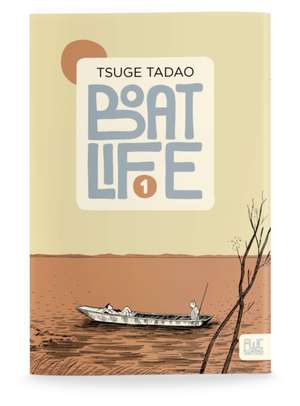Boat Life Vol. 1: Boat Life
Autor Tadao Tsuge Traducere de Ryan Holmbergen Limba Engleză Paperback – 6 dec 2022
Preț: 124.45 lei
Nou
23.82€ • 25.88$ • 20.02£
Carte disponibilă
Livrare economică 31 martie-14 aprilie
Livrare express 15-21 martie pentru 33.33 lei
Specificații
ISBN-10: 1942801122
Pagini: 324
Ilustrații: B&W illustrations throughout
Dimensiuni: 147 x 208 x 22 mm
Greutate: 0.57 kg
Editura: Floating World Comics
Seria Boat Life
Notă biografică
Tsuge Tadao is one of alternative manga's cult stars. Debuting as a cartoonist in the rental kashihon market in 1959, he was a leading contributor to the legendary magazine Garo during its heyday in the late 1960s and '70s. He has drawn extensively for magazines like Yagyo, Comic Baku, and Gento, often pulling from his experiences growing up in the slums of Tokyo, working for ooze-for-booze blood banks, and daydreaming while fishing. He currently lives in Chiba Prefecture, north of Tokyo, where he splits his time between cooking for his family and drawing ever-stranger manga. His work has been translated into English, Spanish, and Italian.
Descriere
Serialized between 1996 and 2000, Boat Life stars novelist Tsuda Kenta, a lightly veiled stand-in for the artist, Tsuge Tadao, himself, as he pursues a life of reprieve and reverie on a small, makeshift house boat on a river outside of Tokyo.
Based loosely on the artist’s own daily life, this charming story follows the hapless protagonist on a series of magical absurdist quests, featuring a panoply of personable characters, including a drunkard fisherman, a pervy monk, a talking corpse, a senile hermit, and a half-supportive, half-doubtful wife and adult son.
Most of the scenes take place on the Tonegawa River in Chiba, a favorite fishing spot of Tsuge’s. Others occur at the artist’s home or at Joker, a jeans and apparel shop the Tsuges opened in 1977.
While fans of Trash Market and Slum Wolf will enjoy this late-career elaboration of après-guerre themes Tsuge has been exploring since his debut in the legendary alt-manga magazine Garo in the late ‘60s, fans of his brother Tsuge Yoshiharu’s The Man Without Talent will appreciate the more relaxed and optimistic take on middle-aged reclusion and the grind of work and family.
